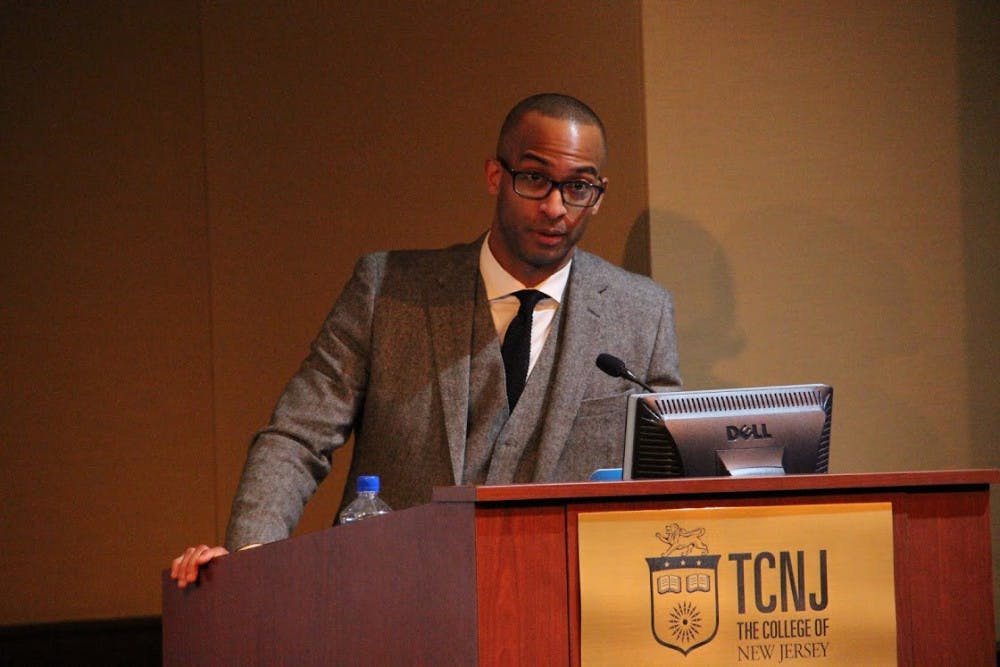By Mylin Batipps
Social Media Editor
Inequality is not going away in America, according to Dorian Warren, associate political science professor from Columbia University. In fact, it continues to grow.
“We’ve been growing unequal for the last 40 years when it comes to income and wealth in this country,” Warren said.
The professor and host of MSNBC’s online news program “Nerding Out” visited the College and spoke to students on Wednesday, Feb. 4, in the Library Auditorium. Co-sponsored by the School of Humanities and Social Sciences and the Black Student Union (BSU), Warren’s interactive discussion, entitled “Inequality and the Future of U.S. Democracy,” attempted to discover reasons for the many aspects of inequality in the country today, particularly with income distribution and wealth.

Warren started the discussion by looking back at four anniversaries of events that sought to end inequality. Although there were milestones like 1963’s March on Washington for Jobs and Freedom and 1964’s Economic Opportunity Act — which was President Lyndon B. Johnson’s call for a war on poverty — one would think that those events in history actually never took place, looking at the country’s current state.
“Just last week, an article in The Washington Post was published that shows for the first time in history, the majority of students in American public schools are in poverty,” Warren said. “So we have a long way to go, even as we mark these milestones.”
Child poverty is a prevalent issue in the U.S., according to Warren, in which roughly 25 percent of children in America are suffering from poverty. Breaking it down racially for children under age 6, 14 percent of white children, 42 percent of black children and one in three Hispanic children live in poverty today.
“I want to point out that we are world leaders in lots of things, those of us here in the U.S.,” Warren said. “One of them is child poverty.”
On the other hand, wealth is becoming more concentrated, according to Warren. A study from Oxfam that was published several weeks ago shows that the richest 80 people in the world now have as much wealth as the bottom 50 percent of all people in the world—3.5 billion people. In 2010, it took 388 billionaires to have as much wealth as the bottom 50 percent, but now it only takes 80.
Furthermore, the size of the middle class is slowly decreasing, Warren said. In 1967, the middle class made up 53 percent of the entire U.S. population, and as of 2013, it made up only 43 percent.
“Our vast middle class that made us a growing and strong democracy especially in the post-World War II years has been shrinking, especially over the last 40 years,” Warren said.
Some say that outsourcing of jobs is a key factor to the middle class decreasing in size, he explained.
“This argument is that as we’ve increased our trade (especially with more developing companies), and we’ve exported lots of good-paying, middle class jobs,” he said. “But we haven’t replaced them with the same kind of jobs over the last 40 years.”
Looking at the bigger picture, inequality in the U.S. is caused by issues in addition to outsourcing, like wage theft, the weakening of labor unions and the rise of involuntary part-time work. Instead of meeting the hour requirement to be declared as full-time workers, people are instead forced to work just below the requirement, according to Warren. This is so that employers can avoid providing benefits to their employees, which is costly.
Students who attended the lecture were able to get a preview of what to look out for in the working environment.
“I was surprised to learn just how much inequality there is in the U.S. workplace,” senior communications major Jaqueline Ilkowitz said. “I thought that Warren did an excellent job of explaining a complex economic situation in a way that made it easy to comprehend, and I left the lecture having a better understanding of what the workplace will be like after fellow students and I graduate.”
Senior finance major and Black Student Union Treasurer Ashley Hutchinson, who stated that her opinion does not reflect that of the organization’s, said she learned that it’s becoming increasingly more difficult to obtain a job with a college degree than it is to do so without one.
“I learned that having a bachelor’s and in some cases a master’s degree is not guaranteed to save Americans from suffering from economic inequality,” Hutchinson said. “The job growth for people with bachelor’s and master’s degrees is much slower than the job growth for those who do not hold degrees from higher education.”
Warren ended the lecture with two questions for everyone who attended to think about, based on the future of the country’s democracy.
“There’s the question as to whether the American Dream is still alive,” he said. “One should also think about a kind of world they’d want to see in 15 years and what they would need to do to realize that world.”







